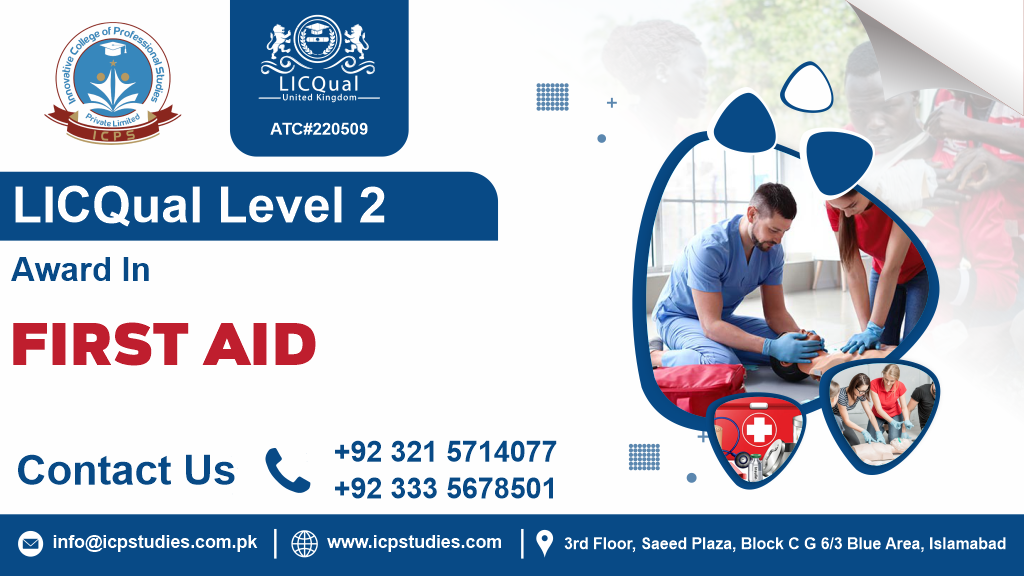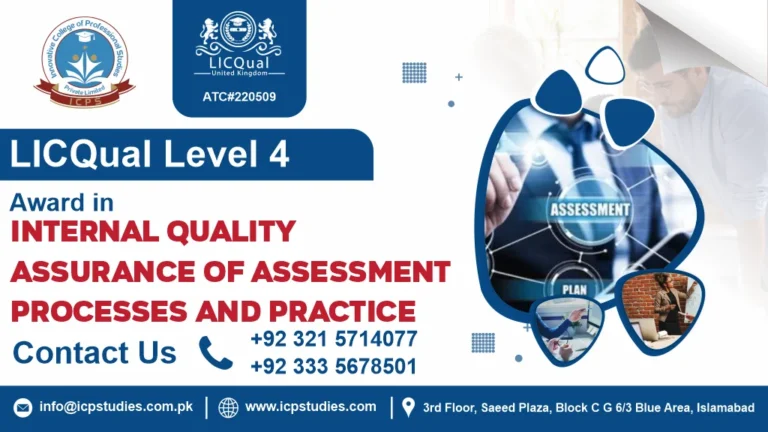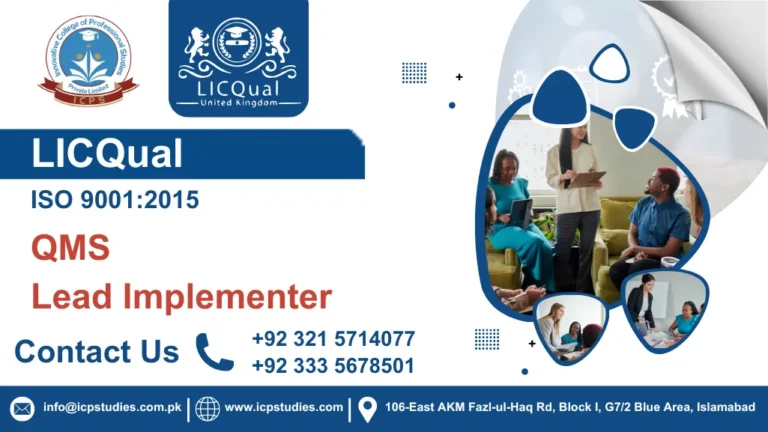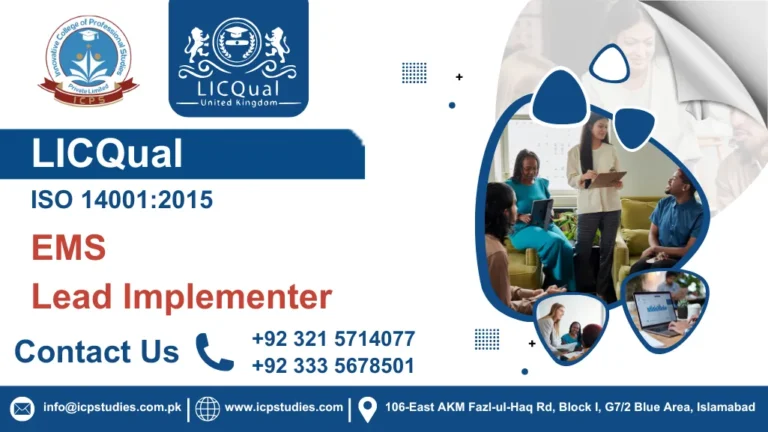Our program covers a wide range of essential first aid skills, from basic wound care to CPR and defibrillation techniques. You’ll learn how to assess a situation quickly and respond effectively, providing vital support until professional medical help arrives.
The LICQual Level 2 Award In First Aid is accredited and recognized by industry standards, giving you a credential that holds weight in various sectors, including workplaces, schools, community organizations, and more.
We believe in learning by doing. That’s why our training incorporates practical exercises and simulations, allowing you to practice your skills in a controlled environment under the guidance of experienced instructors.
We understand that everyone’s schedule is different. That’s why we offer flexible training options, including in-person classes, online modules, and blended learning formats. Whether you prefer to learn in a classroom setting or from the comfort of your own home, we have a solution that suits your needs.
Armed with the knowledge and skills gained from the LICQual Level 2 Award In First Aid, you’ll feel more confident and prepared to handle emergencies, both in your personal and professional life. You’ll be equipped to step up and take action when it matters most.
Don’t wait until disaster strikes to realize the importance of first aid training.. Enroll now in the LICQual Level 2 Award In First Aid today. Whether you’re a novice or looking to refresh your skills, our program offers something for everyone. Invest in yourself, and be prepared to make a difference when it counts the most.
All About Level 2 Award in First Aid
Course Overview
The LICQual Level 2 Award in First Aid is a comprehensive training program designed to equip individuals with the knowledge and skills necessary to provide effective first aid in a variety of situations. Accredited by LICQual, an internationally recognized awarding organization, this course covers essential topics in first aid, including but not limited to:
Participants learn how to recognize and respond to life-threatening emergencies, including cardiac arrest and choking. Techniques such as cardiopulmonary resuscitation (CPR) and the use of automated external defibrillators (AEDs) are covered extensively.
Understanding how to assess and treat different types of wounds, including cuts, burns, and fractures, is a crucial aspect of first aid training. Participants learn proper wound cleaning, dressing, and immobilization techniques to minimize further injury and promote healing.
- From allergic reactions to diabetic emergencies, participants are trained to recognize and respond to various medical conditions promptly. They learn how to assess symptoms, provide appropriate care, and seek additional medical assistance when necessary.
- Injuries such as sprains, strains, and head trauma are common occurrences that may require immediate attention. The course teaches participants how to stabilize injured individuals, prevent further damage, and safely transport them to medical facilities if needed.
- eyond individual first aid skills, participants learn how to assess emergency situations, prioritize actions, and coordinate with emergency services effectively. Developing a comprehensive emergency response plan can significantly improve outcomes in crisis situations.
Participants can choose from a range of flexible training options, including in-person classes, online modules, and blended learning formats, to accommodate their schedules and learning preferences. Upon successful completion of the course and assessment, participants receive the LICQual Level 2 Award in First Aid certification, demonstrating their competency in providing first aid assistance effectively.
Study Units
Learning Outcomes
Here are the outcomes for each study unit:
- Introduction to First Aid:
- Understand the importance of first aid in emergency situations.
- Recognize legal and ethical considerations related to providing first aid.
- Identify personal safety measures and the importance of scene safety assessment.
- Assessment and Prioritization:
- Learn systematic approaches to assess an injured or ill individual.
- Recognize signs and symptoms of different medical emergencies and injuries.
- Prioritize actions based on the severity of the condition and the resources available.
- Cardiopulmonary Resuscitation (CPR):
- Demonstrate proper techniques for performing CPR on adults, children, and infants.
- Understand the importance of early CPR initiation in cardiac arrest situations.
- Recognize when to perform CPR and when to seek additional medical assistance.
- Wound Management and Control of Bleeding:
- Learn how to assess and clean various types of wounds, including cuts, abrasions, and punctures.
- Apply appropriate wound dressing techniques to minimize infection risk and promote healing.
- Identify methods for controlling bleeding, including direct pressure, elevation, and the use of pressure dressings or tourniquets.
- Fractures, Sprains, and Strains:
- Recognize signs and symptoms of fractures, sprains, and strains.
- Learn how to stabilize injured limbs and joints to prevent further damage.
- Understand the importance of immobilization and proper transportation of individuals with suspected fractures.
- Medical Emergencies:
- Identify common medical emergencies such as allergic reactions, diabetic emergencies, and seizures.
- Understand appropriate first aid interventions for managing medical emergencies.
- Recognize when to provide first aid and when to seek advanced medical care.
- Choking and Airway Obstruction:
- Learn how to recognize and assess choking emergencies in conscious and unconscious individuals.
- Demonstrate proper techniques for clearing airway obstructions using abdominal thrusts (Heimlich maneuver) and back blows.
- Understand the importance of rapid intervention in choking situations to prevent asphyxiation.
By the end of this course, participants will have acquired the knowledge and skills necessary to respond confidently and effectively to a wide range of medical emergencies and injuries, thereby potentially saving lives and minimizing the impact of accidents and sudden illnesses.
Admission Criteria
Entry requirements for the LICQual Level 2 Award in First Aid course typically include:
- Minimum Age Requirement: Participants must be at least 16 years old to enroll in the course. This ensures that participants have the maturity and responsibility necessary to handle the content and practical aspects of first aid training.
- Language Proficiency: As the course materials and assessments are conducted in English, participants should have a sufficient understanding of the language to comprehend instructions, participate in discussions, and complete written assessments.
- Physical Fitness: While no specific physical fitness requirements are mandated, participants should be capable of performing basic first aid maneuvers, including CPR compressions and assisting with moving injured individuals if necessary. Individuals with mobility issues or medical conditions that may hinder their ability to participate in practical exercises should inform course instructors beforehand to ensure appropriate accommodations are provided.
- Health Declaration: Participants may be required to complete a health declaration form stating that they are physically and mentally fit to participate in the course activities. This ensures the safety of both participants and instructors during practical exercises.
- Legal Requirements: Depending on local regulations and jurisdictional requirements, participants may need to provide proof of identification, such as a driver’s license or passport, to verify their identity and eligibility for the course. Additionally, participants may need to consent to background checks or provide documentation related to criminal history if required by relevant authorities.
- Pre-Course Reading: Some training providers may recommend or require participants to complete pre-course reading or online modules to familiarize themselves with basic first aid concepts and terminology before attending the course. This helps ensure that participants have a foundational understanding of first aid principles, allowing for a more effective and efficient learning experience during the training sessions.
- Previous Qualifications: While not always necessary, individuals with prior first aid training or certifications may find it beneficial to build upon their existing knowledge by enrolling in the LICQual Level 2 Award in First Aid course. Previous qualifications in related fields, such as healthcare or emergency response, may also be considered advantageous but are not typically mandatory for entry into the course.
It’s essential for prospective participants to review the specific entry requirements outlined by the training provider offering the LICQual Level 2 Award in First Aid course, as requirements may vary slightly depending on the organization and jurisdiction. By ensuring that they meet the entry requirements, individuals can maximize their learning experience and successfully complete the course to become certified in first aid.
Ideal Candidate
This course is particularly suitable for:
- Workplace Personnel: Employees across various industries can greatly benefit from first aid training to ensure the safety and well-being of themselves and their colleagues. From office settings to construction sites, having trained first aid responders can be invaluable in emergency situations.
- Parents and Caregivers: Parents, guardians, and caregivers play a vital role in ensuring the safety of their families. First aid training equips them with the skills to handle common childhood injuries and illnesses, providing peace of mind and the ability to respond effectively in emergencies.
- Community Volunteers: Individuals involved in community organizations, sports clubs, and volunteer groups can become valuable assets by obtaining first aid certification. Whether assisting at events or providing aid in local neighborhoods, trained volunteers can make a significant difference in times of need.
- Educators and School Staff: Teachers, administrators, and other school personnel are responsible for the safety and well-being of students while on school grounds. First aid training ensures they can respond confidently to medical emergencies that may occur during school hours or extracurricular activities.
- Healthcare Professionals: While healthcare professionals already possess medical training, additional first aid certification can enhance their skills and readiness to respond to emergencies outside clinical settings. It ensures they are prepared to provide immediate assistance in unforeseen situations, such as accidents or medical emergencies in public spaces.
- Individuals Seeking Personal Development: Whether pursuing personal interests or career advancement, obtaining first aid certification demonstrates a commitment to personal development and the well-being of others. It can enhance job prospects, boost confidence, and provide valuable life skills applicable in various situations.
- Emergency Response Teams: Members of emergency response teams, including firefighters, police officers, and search and rescue personnel, benefit from first aid training as part of their comprehensive skill set. It enables them to provide immediate assistance to individuals in distress while awaiting further medical intervention.
In summary, the LICQual Level 2 Award in First Aid course is suitable for anyone interested in acquiring essential life-saving skills. Whether for professional development, personal enrichment, or fulfilling regulatory requirements, this course empowers individuals to respond effectively to medical emergencies and contribute to safer communities.
FAQs about Level 2 Award in First Aid







